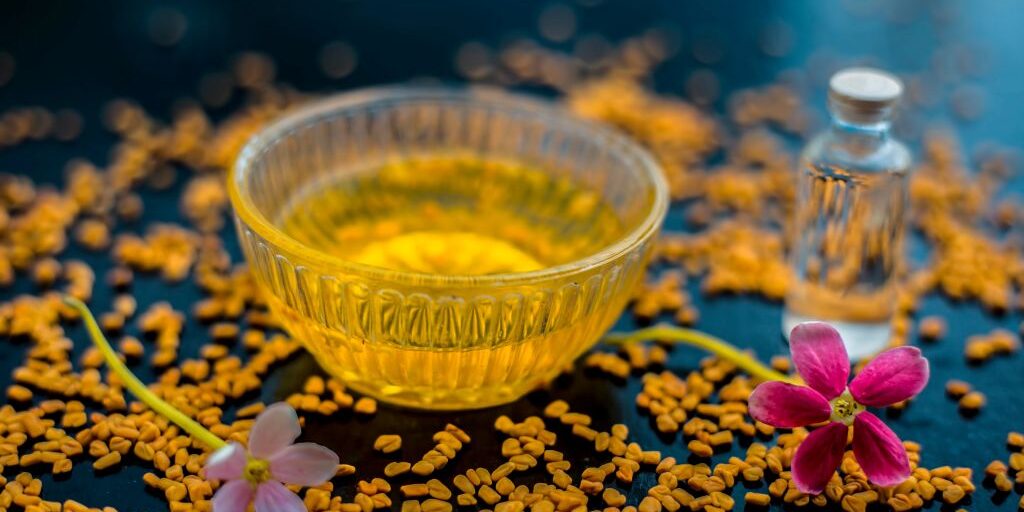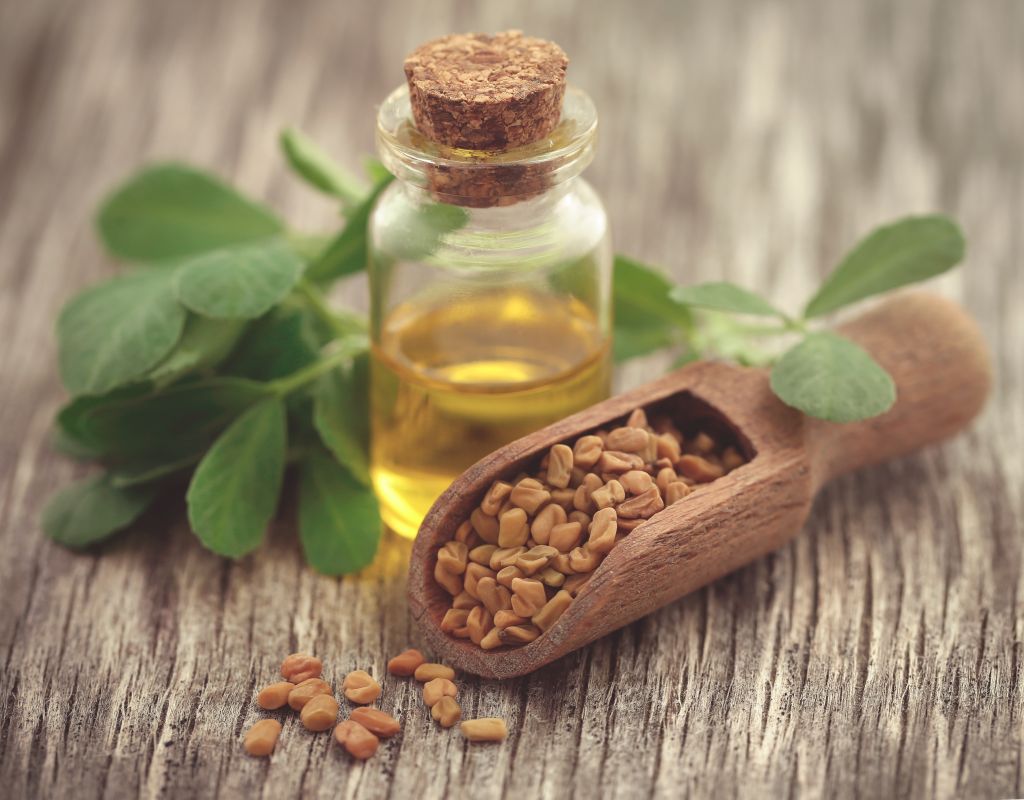
How to Make Fenugreek Oil at Home (And Why You Should)
Among the many healing herbs that have stood the test of time, fenugreek quietly holds its place as one of the most versatile and underrated. Known for its maple-like scent and a deep, earthy flavor, fenugreek (Trigonella foenum-graecum) has been used for thousands of years in traditional medicine systems, including Ayurveda and ancient Greek healing practices.
While its seeds are often used in cooking and herbal teas, today we’re focusing on a powerful preparation you can make in your own kitchen: fenugreek-infused oil. This simple remedy captures the nourishing properties of fenugreek in a form that’s perfect for topical use and surprisingly easy to make at home.
Let’s explore what makes this oil so beneficial, how to prepare it yourself, and how you can use it to naturally support your skin, hair, and overall well-being.
The Healing Benefits of Fenugreek Oil
Fenugreek seeds may be small, but they are packed with bioactive compounds that offer powerful support for the body. When infused into oil, these healing compounds are drawn out and made more readily available for external use.
Some of the key benefits of fenugreek oil include:
1. Hormonal Support for Women
Fenugreek contains phytoestrogens, plant-based compounds that mimic estrogen in the body. This makes the oil especially helpful for women experiencing hormonal fluctuations during PMS, perimenopause, or menopause. While not a cure-all, it may ease symptoms such as cramping, mood swings, and breast tenderness when massaged into the lower abdomen or used in warm compresses.
2. Natural Anti-inflammatory Properties
Thanks to its rich concentration of flavonoids and alkaloids, fenugreek oil has a soothing, anti-inflammatory effect on the skin and muscles. When applied topically, it can reduce swelling, calm irritated tissues, and promote healing, making it especially useful for arthritic joints, sore muscles, or inflamed skin conditions like eczema or acne.
3. Promotes Hair Growth and Scalp Health
Fenugreek oil is widely loved in natural hair care routines. It nourishes the scalp, strengthens hair at the root, and helps reduce shedding or breakage. The lecithin content acts as a natural moisturizer, while proteins in the seeds help repair damaged strands and stimulate new growth.
4. Skin-Softening and Scar-Fading Effects
Used regularly, fenugreek oil can soften rough or dry patches of skin and gradually reduce the appearance of scars, stretch marks, or minor discoloration. The oil’s emollient and regenerative properties encourage smoother, more even-toned skin over time.
How to Make Fenugreek Oil at Home
 Creating your own herbal oils may sound complex, but the truth is, these old-world remedies are often beautifully simple. By infusing the seeds in a carrier oil of your choice, you can draw out their therapeutic qualities without the need for expensive tools or special equipment.
Creating your own herbal oils may sound complex, but the truth is, these old-world remedies are often beautifully simple. By infusing the seeds in a carrier oil of your choice, you can draw out their therapeutic qualities without the need for expensive tools or special equipment.
Here are two traditional methods to choose from: the slow cold infusion and the faster warm infusion. Both produce a high-quality, richly scented oil.
Ingredients and Supplies
¼ cup whole fenugreek seeds – Organic is best. Avoid ground seeds, as they may cloud the oil and reduce potency.
1 cup carrier oil – Olive oil is a traditional favorite for skin and hair, but sweet almond or coconut oil also work well depending on your preference.
1 clean glass jar with a tight-fitting lid
Cheesecloth or a fine mesh strainer
Optional: A small saucepan (for the warm method)
Method 1: Cold Infusion (Recommended for Best Potency)
This slow, natural method allows the oil to absorb the healing constituents of the fenugreek seeds gradually over time.
Begin by slightly crushing the fenugreek seeds using a mortar and pestle. This helps release the aromatic oils and medicinal compounds.
Add the crushed seeds to your clean, dry glass jar.
Pour in the carrier oil until the seeds are fully submerged. Stir gently to eliminate air pockets.
Seal the jar tightly and place it in a warm, sunny windowsill.
Let the oil infuse for at least 2 to 3 weeks. Shake the jar gently once per day to keep the contents evenly mixed.
After the infusion period, strain the oil through cheesecloth or a fine mesh sieve to remove the seeds.
Pour the finished oil into a dark glass bottle to protect it from light. Store in a cool, dry place for up to 6 months.
Method 2: Warm Infusion (Faster but Slightly Less Potent)
If you’re in a hurry, this method yields usable oil within a couple of hours.
Combine the crushed fenugreek seeds and carrier oil in a small saucepan.
Heat over the lowest setting on your stovetop, being very careful not to let the oil simmer or smoke.
Allow the oil to infuse gently for 1 to 2 hours, stirring occasionally.
Remove from heat and let cool completely.
Strain, bottle, and store as in the cold infusion method.
How to Use Fenugreek Oil
Once prepared, your fenugreek oil becomes a versatile tool in your herbal medicine cabinet. Here are several ways to put it to use:
For Hair and Scalp:
Massage a small amount of oil into your scalp and along the length of your hair. Leave it on for at least 30 minutes (or overnight under a towel) before washing. Use weekly to reduce hair fall, strengthen roots, and stimulate growth.
For Menstrual Relief:
Warm a few teaspoons of the oil and gently massage into the lower abdomen to help ease cramping and discomfort. Its phytoestrogen content may support hormonal balance and promote a sense of calm.
For Skin Healing:
Apply a thin layer to dry, itchy, or inflamed skin. It’s especially helpful for conditions like eczema, sunburn, or even chapped winter skin. For scars or stretch marks, apply daily and massage gently to encourage circulation and tissue repair.
For Massage or Muscle Soreness:
Use as a base oil to soothe stiff joints, sore muscles, or tension headaches (applied to the temples and neck). You can also blend it with essential oils like lavender or rosemary for added therapeutic effect.
Important Precautions
While fenugreek oil is generally safe and well-tolerated, it’s not suitable for everyone.
Avoid using fenugreek oil if:
You are pregnant – Fenugreek can stimulate uterine contractions and is not considered safe during pregnancy unless directed by a healthcare provider.
You have hormone-sensitive conditions – Because of its phytoestrogen content, it may interfere with conditions like breast cancer, endometriosis, or fibroids.
You’re allergic to legumes – Fenugreek is part of the legume family, and those with a known allergy should avoid it.
You take blood-thinning medications – Fenugreek may enhance the effects of anticoagulants and should be used cautiously.
As with any herbal remedy, always perform a patch test before applying to larger areas of skin, and consult a practitioner if you have any concerns.
Learn to Build Your Own Home Apothecary
If you enjoyed making your own fenugreek oil, you’re going to love what else is possible with just a handful of herbs and some simple kitchen tools.
The Forgotten Home Apothecary is a step-by-step guide to building your own collection of natural remedies—just like this one. From healing salves and tinctures to infused oils and old-time teas, this book is filled with over 100 practical, time-tested recipes you can use every day.
👉 Start making your own herbal medicine at home—just like your ancestors did.
Click here to get your copy of The Forgotten Home Apothecary
Final Thoughts on Fenugreek Oil
There’s something deeply satisfying about crafting your own herbal oils. It connects you to nature, tradition, and the old ways of healing—using what’s around you to support your health, naturally and simply.
Fenugreek oil is just one of many remedies you can master from your own kitchen. Why not start today?
You May Also Like:
 4 Essential Oils To Support Hair Growth
4 Essential Oils To Support Hair Growth
What Happens If You Pour Honey Over Cinnamon? (video)
